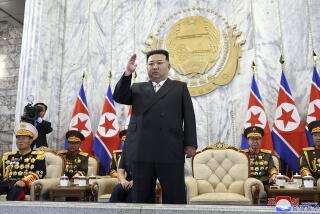Moscow Parade Marks Revolution : Defense Minister’s Absence Reinforces Rumors of Illness
- Share via
MOSCOW — The Soviet Union marked the 69th anniversary of the Bolshevik revolution today with a military parade through Red Square but without its apparently ailing defense minister.
In place of an expected speech by Defense Minister Sergei Sokolov, his first deputy, Gen. Pyotr Lushev, reviewed the troops and vowed to counter U.S. military pressure.
The absence of Sokolov, 75, an alternate member of the ruling Politburo, reinforced rumors that he is seriously ill.
Two years ago, Sokolov’s predecessor, Dmitry Ustinov, failed to appear at the Red Square parade. He died six weeks later.
American Ambassador Arthur A. Hartman and other Western ambassadors boycotted the parade as they have every year since the Soviet invasion of Afghanistan at the end of 1979.
Equipment Familiar
Formations of marching troops from military academies were followed by a carefully rehearsed display of mechanized forces grinding down Gorky Street and into Red Square. The equipment appeared little changed from other parades of recent years, with front-line T-72 tanks followed by missiles that dated to the 1960s.
Armored personnel carriers, moving four abreast, roared past the thousands of onlookers--including Soviet leader Mikhail S. Gorbachev and other leaders standing on the Lenin Mausoleum.
Gorbachev’s wife, Raisa, could not be seen but his daughter Irina and granddaughter Oxanna were standing at the back of a VIP section beside the mausoleum.
Uncle Sam Figure
An 8-foot-tall Uncle Sam, bent double by a burden of missiles, bobbed along through Red Square next to a larger-than-life model of Lenin being carried by workers.
A few snowflakes drifted down from slate-gray skies for the extravaganza, which celebrates the coming of communism to Russia. Thousands of Moscow workers followed the military parade through the square.
Gorbachev, at a post-parade reception, repeated the Kremlin view that arms control talks must be based on what it believes was agreed to at the Iceland summit.
“The Soviet leader said a new situation had taken shape after the Reykjavik meeting,” the official Tass press agency reported. “He said there was now no road back.”
Arms control discussions in Vienna between U.S. Secretary of State George P. Shultz and Soviet Foreign Minister Eduard A. Shevardnadze ended Thursday in failure.
More to Read
Sign up for Essential California
The most important California stories and recommendations in your inbox every morning.
You may occasionally receive promotional content from the Los Angeles Times.













